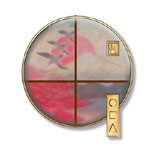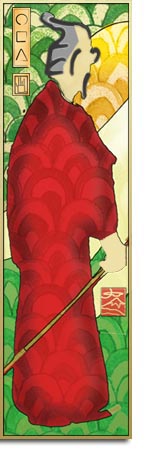On The Way: The Daily Zen Journal
On the Transmission of Mind – Pt 12
Huang-po (d. 850)
When a sudden flash of thought occurs in your mind, and you recognize it for a dream or an illusion, then you can enter into the state reached by the Buddhas of the past, not that the Buddhas of the past really exist, or that the Buddhas of the future have not yet come into existence.
Above all, have no longing to become a future Buddha; your sole concern should be, as thought succeeds thought, to avoid clinging to any of them.
If a Buddha arises, do not think of him as “enlightened” or “deluded,” “good” or “evil.” Hasten to rid yourself of any desire to cling to him. Cut him off in the twinkling of an eye! On no account seek to hold him fast, for a thousand locks could not stay him, nor a hundred thousand feet of rope bind him. This being so, valiantly strive to banish and annihilate him.
I will now make luminously clear how to set about being rid of that Buddha. Consider the sunlight. You may say it is near, yet if you follow it from world to world you will never catch it in your hands. Then you may describe it as far away, and you will see it just before your eyes. Follow it, and behold, it escapes you; run from it, and it follows you close.
You can neither possess it, nor have done with it. From this example you can understand how it is with the true Nature of all things, and henceforth, there will be no need to grieve or to worry about such things.
Thus all the visible universe is the Buddha, so are all sounds. Hold fast to one principle, and all the others are identical. On seeing one thing, you see all. On perceiving any individual’s mind, you are perceiving all Mind. Obtain a glimpse of one way, and all ways are embraced in your vision, for there is nowhere at all that is devoid of the Way.
When your glance falls upon a grain of dust, what you see is identical with all the vast world-systems with their great rivers and mighty hills. To gaze upon a drop of water is to behold the nature of all the waters of the universe.
Moreover, in thus contemplating the totality of phenomena, you are contemplating the totality of Mind. All these phenomena are intrinsically void, and yet this Mind with which they are identical is no mere nothingness.
By this I mean that it does exist, but in a way too marvelous for us to comprehend. It is an existence which is no existence, a non-existence which is nevertheless existence.
The phenomenal universe and Nirvana, activity and motionless placidity, all are of one substance. By saying that they are all of one substance, we mean that their names and forms, their existence and non-existence are void. The  great world systems, uncountable as the Ganges’ sands, are in truth comprised in the one boundless void.
great world systems, uncountable as the Ganges’ sands, are in truth comprised in the one boundless void.
Then where can there be Buddhas who deliver or sentient beings to be delivered? When the true nature of all things that “exist” is an identical Thusness, how can such distinctions have any reality? To use the symbol of the closed fist: when it is opened, all beings-both gods and men-will perceive there is not a single thing inside.
Therefore it is written, “There’s never been a single thing;” past, present, and future are meaningless. So those who seek the Way must enter it with the suddenness of a sword-thrust. Full understanding of this must come before they can enter.
Whatever Mind is, so also are phenomena. Both are equally real and partake equally of the Dharma-Nature, which hangs in the void. One who receives an intuition of this truth has become a Buddha and attained to the Dharma. No listening, no knowing, no sound, no track, no trace; make yourselves thus, and you will be scarcely less than neighbors of Bodhidharma.
Huang-po (d. 850)
Excerpted from Zen Teaching of Huang Po-Trans John Blofeld 1958




This piece of Huang Po’s touches elements of practice that seem to turn your mind inside out at first. He seems to raise more questions than answers, and thus helps us return to beginner’s mind—that place where we don’t know as much and are ready to learn. We live in a very compelling and seductive world. We need to respond to real events, and at the same time not get lost in these events. We need to communicate and yet, not get lost in the words and concepts which ultimately are divisive at best. We have thoughts and emotions that come up endlessly; how attached we are to these thoughts and feelings is a marker for how enmeshed we are here. And like a true Zen Master we are asked to do things which seem incomprehensible at times and impossible to “master.”
It feels sometimes like having a foot in several worlds. We act according to principle, ideals, and yet can’t get caught up in results. We can almost “grasp” a teaching, and then it eludes us; we feel the breadth of emotions and allow them to flow through us rather than clinging to them.
When a sudden flash of thought occurs in your mind and you recognize it for a dream or an illusion, then you can enter into the state reached by the Buddhas of the past-not that the Buddhas of the past really exist, or that the Buddhas of the future have not yet come into existence.
You could build a life practice around that one paragraph; the challenge is to spend enough time absorbing and enacting any teaching until it becomes one with your being. Until there is no longer the dividing line.
Continuing,
Elana